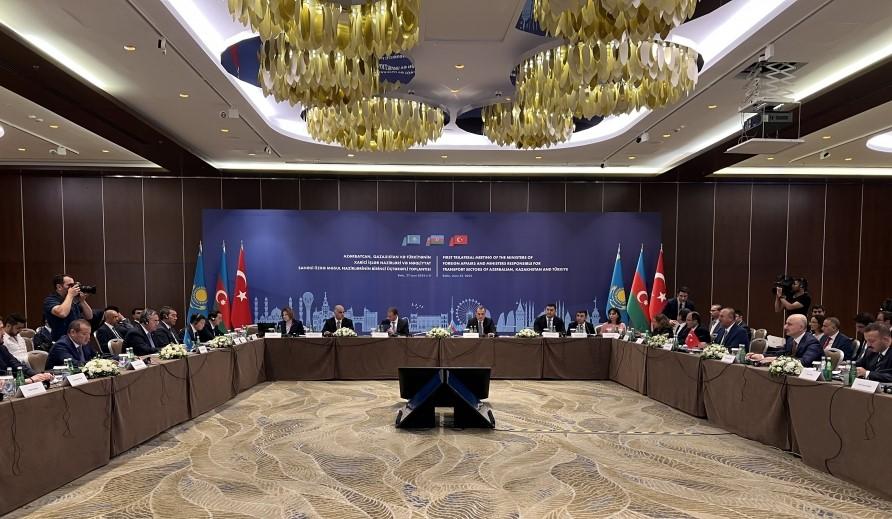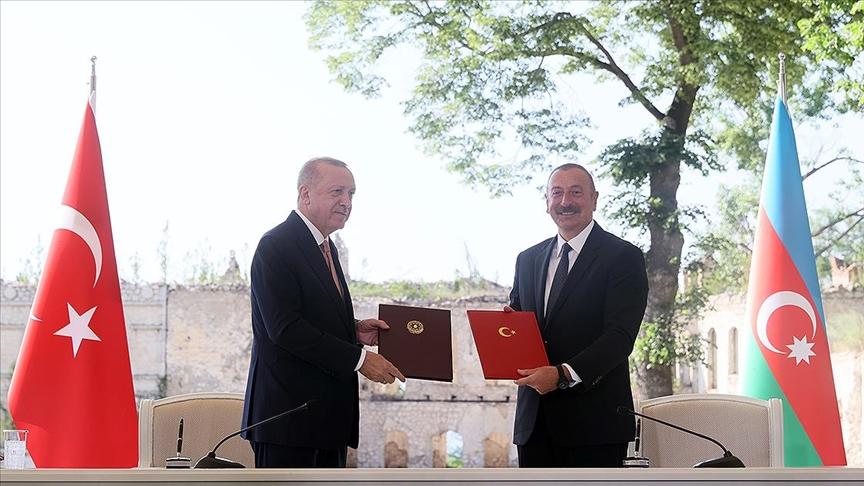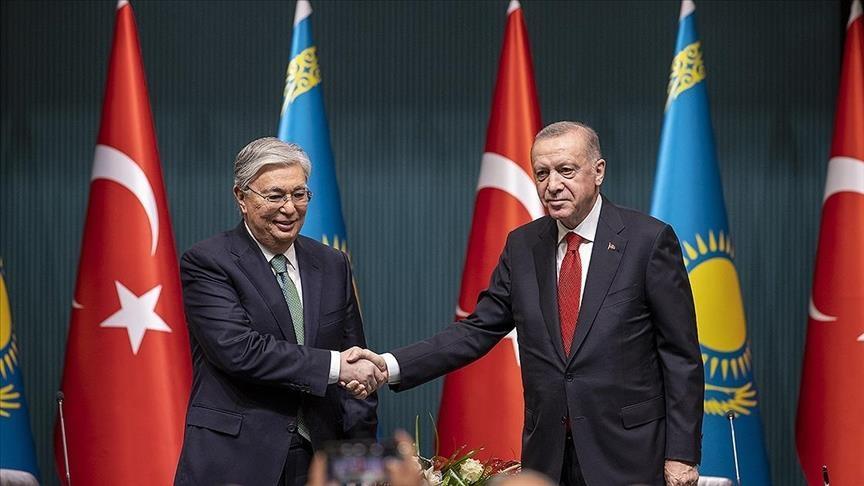Baku-Ankara-Nur-Sultan as agents of Turkic integration Counterbalance to threats of global politics
The first trilateral meeting of the Azerbaijani, Kazakh and Turkish transport and foreign ministers took place in Baku the other day. The event is undoubtedly a landmark one since diverse options for joint activities were discussed during this meeting, and following its results, the parties signed the Baku Declaration providing for cooperation in the field of transport and communications.
In terms of economic feasibility, such an opportunity is significant because it opens up prospects for the implementation of large-scale projects of regional significance. That is, in the future, the conditions for expanding the transit potential of all three countries can be considered, which is very beneficial against the background of current threats to global security and economic development. From the point of view of economic feasibility, everything is going quite well: all three states are located at the intersection of the international East-West and North-South transport corridors, which allows them to play the function of transit countries connecting Europe and Asia.

In addition, Azerbaijan, Kazakhstan and Türkiye make a significant contribution to the development of Caspian-Black Sea cooperation by strengthening transport and communication links and expanding the trilateral trade potential. In fact, these are the main economic aspects of future trilateral cooperation, the strengthening of which is on the agenda of all three countries of the region. At the same time, the creation of a new economic union with the participation of these regional states is also aimed at strengthening the political dialogue between Azerbaijan, Kazakhstan and Türkiye. The fact that the three states cooperate closely in the Organisation of Turkic States (OTG), the Organisation for Economic Cooperation (ECO) and other regional organisations greatly contributes to the strengthening of the countries' interest in each other both in trade and economy and in regional politics, which is extremely important in the context of global political reformatting. Against the background of geo-economic and geopolitical processes taking place in the world, regional unions are becoming particularly important, and in this sense, the Kazakhstan-Azerbaijan-Türkiye trilateral political format can play a serious role.
Undoubtedly, the Turkic factor, based on a common religion, culture and political interests, sets a powerful tone for the rapprochement of the positions of Baku, Ankara and Nur-Sultan. And the fact that the foreign policy of all three states is aimed at strengthening Turkic unity is a fundamentally important point. If Azerbaijan and Kazakhstan received the status of regional states only three decades ago (after gaining independence as a result of the collapse of the USSR), then Türkiye, as a significant part of the greater Turkic world, has long established itself as a leading geopolitical player, with the interests of which such superpowers as the United States, Britain, Russia, as well as the countries of the NATO military bloc, in particular of which Ankara itself is a part. Without excessive pathos, it is worth admitting that it was Türkiye, thanks to a balanced and flexible foreign policy built up for many years, that raised the importance of the Turkic factor to a high level. And the political experience of Azerbaijan and Kazakhstan, which also fully support the idea of Turkic unity throughout the world, is of particular value on this path.
As for the specific trilateral format of cooperation, this was clearly accompanied primarily by fraternal relations between Türkiye and Azerbaijan, close relations with Kazakhstan, as well as bilateral ties between Azerbaijan and each of these countries. It is also important that the relations of all three countries are legally fixed by a military-political document.

As you know, in June 2021, Azerbaijan and Türkiye, having signed the Shusha Declaration, concluded a military alliance, demonstrating solidarity and mutual support on a number of issues of mutual interest. And this fact does not prevent Baku and Ankara from actively cooperating within the framework of international and regional organisations, including the UN, OSCE, Council of Europe, Council of Turkic Cooperation, and Organisation of Islamic Cooperation.
By signing the military alliance, Baku and Ankara have only once again confirmed their readiness for coordinated joint actions in the political and military spheres, in the field of security, based on common national interests. And here it is necessary to note another important aspect. The Shusha Declaration provides for the restructuring and modernisation of the Armed Forces, strengthening both countries' defence capability and military security. And this is an unambiguous request for unconditional military support of the parties in crisis situations.
At the same time, it is appropriate to recall that relatively recently, in this May, the Turkish and Kazakh leaders signed a joint statement on an expanded strategic partnership. On May 10, within the framework of the state visit of Kazakh President Kassym-Jomart Tokayev to Türkiye, Kakzkah Defence Minister Ruslan Zhaksylykov met his Turkish counterpart Hulusi Akar, during which a number of documents regulating bilateral military cooperation were signed. It is known that Türkiye highly appreciated the importance of expanding Turkish-Kazakh defence ties, including joint military exercises and the defence industry.
Interestingly, Tokayev's visit to Türkiye did not go unnoticed by foreign politicians and experts. Some of them were sceptical about the Kazakh president's trip, describing it as Türkiye's desire to strengthen ties with the Central Asian states that are still in Russia's influence zone. Meanwhile, the reality is changing. Expanding the agenda of cooperation with the countries of Central Asia, Türkiye does not set out to drive them into the orbit of its influence in order to create threats to the security of its regional allies, in particular Russia. Ankara consistently builds allied relations with Moscow based on pragmatism and mutually beneficial interest. Its foreign policy is aimed exclusively at preserving regional security and stability.

In this sense, the policy of Azerbaijan and Kazakhstan fully coincides with Türkiye's political aspirations. This, first of all. Secondly, it is appropriate to recall that it was Azerbaijan and Kazakhstan that offered Russia and Türkiye political mechanisms to overcome the crisis of 2015. President Ilham Aliyev then took a personal initiative to promote dialogue between Ankara and Moscow. Baku's friendly and wise gesture was rightfully appreciated in fraternal Türkiye. And this is just one of the few examples of how Azerbaijan and Kazakhstan show attention and support for the interests of Türkiye, including for the sake of maintaining regional stability and peace.
By the way, the unrealised idea of creating a military unit "Army of Turan", put forward at the time by ex-President Nursultan Nazarbayev, still looms as a threat to opponents of this idea. Relatively recently, this topic has regained a new political connotation after Turkish Defence Minister Hulusi Akar's visit to Kazakhstan in 2020. Then a number of foreign media outlets suggested that during the trip Akar plans to discuss the idea of a unified army of the Turkic countries with the country's leadership. Therefore, it is possible that in the foreseeable future this issue will again be discussed in the media, especially against the background of the current rapprochement of Kazakhstan, Türkiye and Azerbaijan.
Meanwhile, in the current geopolitical realities, the close cohesion of the three states of the Turkic world is a truly serious message for opponents of Turkic integration and at the same time a powerful message to all other Turkic–speaking states to unite their positions and raise the status of the Turkic world to a higher, more worthy level. In this sense, Baku, Ankara and Nur-Sultan, being the agents of Turkic integration, demonstrate a triple alliance in opposition to the threats of global politics.








